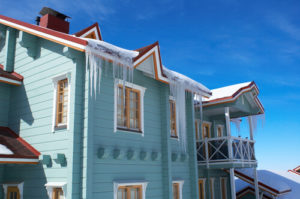The Freeze/Thaw Cycle and Your Chimney
Your chimney is built to last, but it will only last if it’s properly used and maintained. In fact, one of the worst things that can happen to your chimney is 100 percent preventable—water damage. Your chimney may be the largest system in your home, but it still goes forgotten in many cases because a large portion of it is hidden from view. Your chimney may continue to work while  neglected or abused, but it will work less efficiently, and maybe even work with hazardous damage. A damaged chimney may work for a while, but will eventually lead to serious loss of property or even loss of life.
neglected or abused, but it will work less efficiently, and maybe even work with hazardous damage. A damaged chimney may work for a while, but will eventually lead to serious loss of property or even loss of life.
The Working Chimney
The thing that makes your chimney work so well (even while neglected and abused) is the very thing that makes it susceptible to serious damage. Your masonry is porous, allowing gases to escape and remaining unaffected by temperature fluctuations of the chimney structure. However, if you don’t take precautions, this porous material can be seriously damaged in one winter season.
Water and Your Chimney
All of the materials that make up masonry are adversely affected by water. If the chimney cap, flashing, or crown are damaged and not repaired, water will penetrate the system, damaging it from the inside-out. Water can rust damper assemblies, door handles, hinges, and attachments. It can leak into and cause leaks in ceilings, walls, and floors, can weaken structural beams, and even deteriorate the foundation.
Water and Winter Weather
A leaky chimney doesn’t have to start from the inside. Masonry can become chipped or cracked over time. Water can seep into these spaces as rain falls or snow melts, and when temperatures drop, this water freezes. When the water freezes, it expands, breaking apart the masonry (causing more damage). When a fire is lit and the chimney warms up, the water melts and moves further into the damaged masonry. This freeze/thaw cycle may continue throughout the season. The results may be:
- spalling masonry,
- damaged liner,
- unsound chimney structure.
Chimney Maintenance and Damage Prevention
In order to prevent chimney damage and ensure your system is safe for another season of burning, schedule an inspection with a professional. During a NFPA chimney inspection, you can expect a full assessment of your system top-to-bottom. If there is a problem with your flashing, cap, crown, or masonry, it can stop there. Many chimney issues can be dealt with inexpensively when they’re caught in time.
If your chimney system is in good shape, we can add further protection with waterproofing services. ChimneySaver water-repellent is a watertight, vapor-permeable chemical that doesn’t change the look of the masonry, but keeps water out. Schedule waterproofing services now, and avoid water damage later. The freeze/thaw cycle that can damage your chimney will not be possible if water can’t penetrate the masonry.
Call Chief Chimney Services at 631-863-2460 or schedule an appointment online to make sure your chimney is ready for freezing weather.

